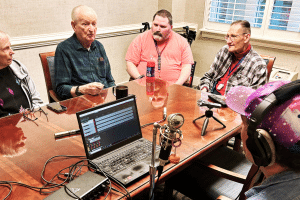
The group had once thrived at Morningside, a Five Star Senior Living community, and featured lively discussions at its meetings, but its ranks had thinned and its get-togethers had grown sluggish. Women are more likely to join activities in senior living communities, said Lisa Duquette, life enrichment programming director at Morningside, and the group had been designed to encourage men to participate in a social activity and engage with each other, limiting their isolation and strengthening their sense of connection with their fellow residents. However, it had stopped working. The group was desperate for a spark.
“We needed to get them talking again,” Duquette said.
Duquette thought a podcast might be exactly the remedy that the group needed, and “The C’Dogs” has delivered, drawing residents together to share stories and get to know each other much better. The podcast has tackled a diverse mix of topics so far. An Oct. 28 recording was built around Halloween and spooky stories. When hurricanes were in the news, residents reminisced about some memorably severe storms they had experienced. An early episode focused on great food in Charlottesville.
“Everybody needs connections,” Duquette said. “It can feel isolating at times when you’re here and family can’t always come to visit, and we all have a need to connect with each other. This helps.”
The technical aspects of creating the show proved to be relatively straightforward. Josh Urban, a local DJ, hosts the podcast, and the show is recorded on-site at Morningside. Urban is “a great talker,” Duquette said, and is able to prompt the residents on the podcast to share their stories and engage in compelling conversations. Many of the residents who participate in the podcast once enjoyed listening to stories on the radio, and they were quick to understand the parallels with the podcast format.
Duquette noted that “we all really like to listen to stories and tell our own, and this is an opportunity to do that.”
“Storytelling is really good for the soul, and it helps us to connect with each other,” she said. “It’s particularly important in a setting like assisted living to make relationships and build on that. The more that they talk and they have these discussions, then the more they can see a common ground that they have with other residents. It really helps them to connect with each other.”
Duquette said part of the fun of creating the show is the tangents in the conversation that can spontaneously emerge. Even when the group ends up “way in left field,” Duquette said, the discussions are inevitably interesting, and “we’re all here together, talking and enjoying it.”
Jim Fitzgerald, a Morningside resident, said the response from the community to the podcast has been enthusiastic. He said it has strengthened his understanding of his fellow residents.
“It’s been super interesting,” Fitzgerald said. “We have folks here who’ve been in wars, who’ve been who’ve done incredible things, and it’s just exciting to hear about them.”
Although the podcast was created within the men’s group, interest in it quickly grew and now women residents also participate. Duquette hopes the podcast will build an audience that includes the Charlottesville community, helping demonstrate Morningside’s value to the area and offering a look at the fascinating people that live there. Duquette said families of residents also benefit from the show, enjoying the opportunity to hear stories that they might never have heard before.
Duquette said she hopes to find opportunities to use the podcast to forge collaborations with other Five Star residences, such as through Zoom podcasts where residents from different communities speak with each other and engage with each other over their interests and personal stories.
“It helps to get them to be more social when they talk about these topics,” Duquette said. “I’ve seen demeanors completely change when a subject comes up, and they can start talking. All of a sudden, we’re laughing, and everyone just can’t wait to tell their own story.”
For those communities who might consider starting a podcast, Duquette said the barrier to entry is very low. “The C’Dogs” is recorded in a conference room with four small microphones – inexpensive and available on Amazon, Duquette said – and a laptop. Some early testing and adjustments helped solve a distracting echo. The first show lasted around 23 minutes, but subsequent episodes have been 15 to 20 minutes longer. Episodes are available on SoundCloud.
Duquette said residents follow loose ground rules and little editing is required.
“I want them to be able to speak freely without feeling like they have to watch what they say,” she said. “That’s very important.”
Duquette said it is crucial to make sure that people do not feel pressured or impeded as part of the discussion. Keeping things open helps the residents feel open with each other.
“The conversations direct themselves,” Duquette said. “They really just flow like a river. When you have people in a room and you start talking, you can find common ground, and that’s powerful.”
